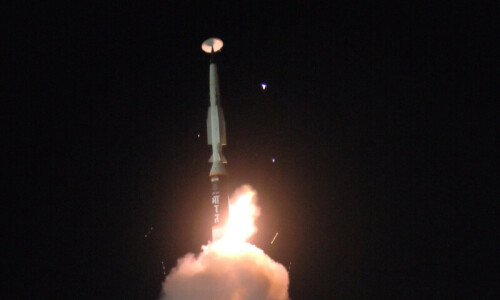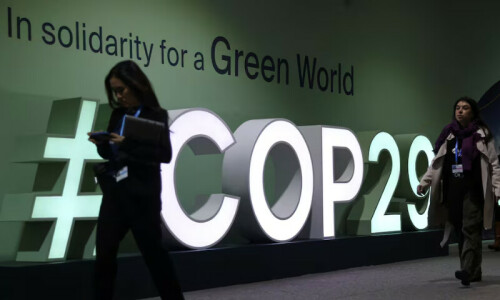AS the threat of a catastrophic conflict between the US and Iran looms large over the region, the government appears to be making a considerable diplomatic effort to defuse simmering tensions between the two countries.
On Friday, Iranian Foreign Minister Javad Zarif concluded his two-day trip here with an encouraging message from Pakistan’s civil and military leadership — that maximum restraint must be exercised in the prevailing situation as conflict in an already volatile region would be a threat to global peace and stability. Mr Zarif expressed his satisfaction with Pakistan’s view that US pressure on Iran was unjustified, while Foreign Minister Shah Mehmood Qureshi emphasised the need for a resolution of the crisis through dialogue.
It is evident from Mr Zarif’s comments as well as Prime Minister Imran Khan’s earlier visit to Tehran that the PTI government is making an effort to avoid taking sides.
It is by no means an easy situation, given Pakistan’s relationship with Saudi Arabia and the UAE — both of whom have been generous in extending monetary support to this government — as well as the US, which can make things difficult by exerting diplomatic and political pressure.
In 2015, parliament’s decision against sending troops to support the Saudi-led intervention in Yemen was a brave step but the current scenario could test the limits of that position.
Pakistan’s relationship with Saudi Arabia runs deep. The countries also enjoy strategic and defence cooperation, so — if the warm reception and vows of solidarity during the Saudi crown prince’s February visit are anything to go by — it will not be easy to stay neutral in the face of a request for support from Riyadh.
In this situation, the guiding principle should be that it is in Islamabad’s best interest to resist pressure.
As it successfully did during the Iran-Iraq war and the ongoing Yemen conflict, Pakistan must remain steadfast in protecting its own interests while also urging a resolution of the crisis.
For instance, Islamabad should use whatever little influence it has to persuade Iran to demonstrate that it is not directly involved in the Yemeni conflict. Or, if the OIC countries push for a strong anti-Iran stance, Pakistan must articulate its position in a way that is not offensive — while pointing out that the ultimate beneficiary of a war would be Israel. It should also be seen to be making an effort to resist conflict. A diplomatic approach would involve a proactive move to counsel its warring allies and make note of positive statements coming from Washington or Tehran.
With a large Shia population of its own and strained relations with India and Afghanistan, Pakistan cannot afford another war in the region. The government should continue to call for restraint, as a US-Iran conflict could plunge this country’s security environment into jeopardy.
Published in Dawn, May 26th, 2019













































